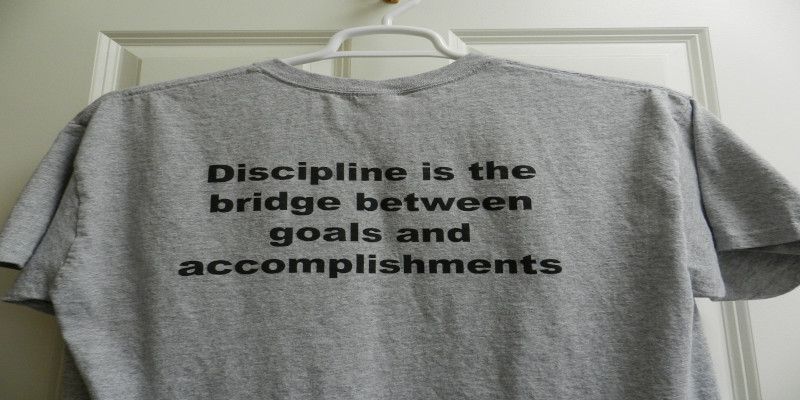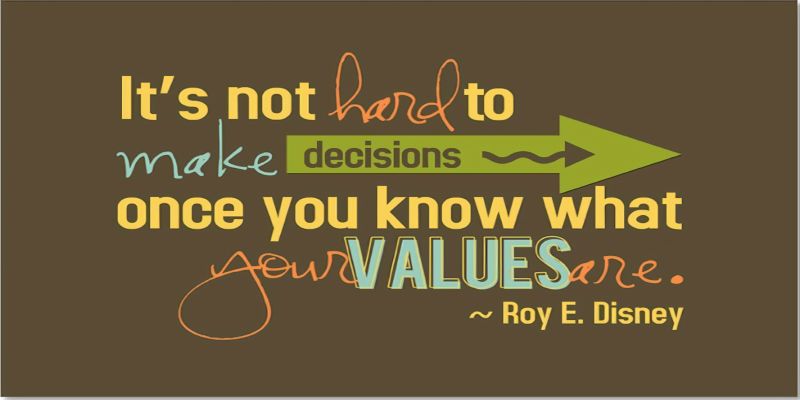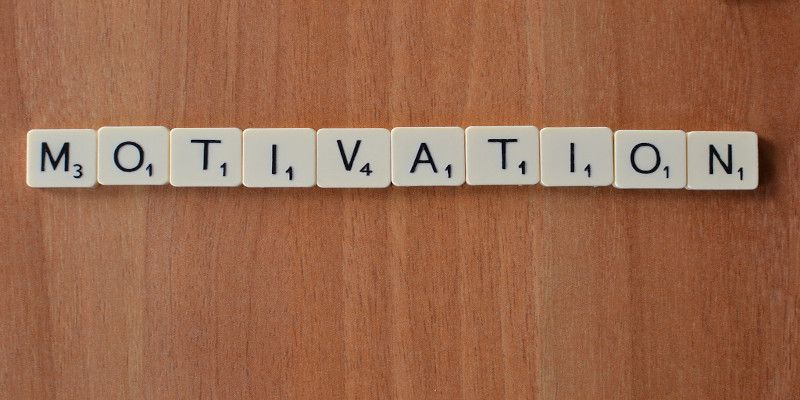Table of Contents
ToggleIt’s easy living life when times are good, and everything is going your way. However, few are willing to persevere through the hardships in difficult times.
That’s why we need to know how to become more disciplined because the going is inevitably going to get tough, and since it’s required to become successful.
Find out what you’re interested in

Although not a requirement, it’s much easier to get, and remain disciplined if you’re doing something you’re interested in.
I know that it was a lot easier for me personally to practice sports in school because that was something that I enjoyed doing and was good at rather than studying. That’s because I didn’t enjoy school, or learning at all for that matter when I was younger.
Pick your goal(s)
It’s much harder to persevere when we’re simply pointlessly struggling without a good cause or reason.
On the flip side, it’s much easier to move on when the going gets tough when we have clearly defined goals we’re trying to accomplish.
Having well-defined destinations is needed if we ever wish to attain them. That’s because it’s hard, if not outright impossible to get on the right track if we don’t even know where we have to go.
Analyze your strengths and weaknesses

Analyzing your strengths and weaknesses is something everyone should do.
It’s smart to play to your strengths, yet you should work on your weaker areas as well.
If you know that you’re easily distracted for instance, then it makes sense to study in a room without a lot of noise, no cell phone, and no television. Because why would you make it any harder than it already is?
Performing a SWOT analysis can help you to figure out where your strengths and weaknesses lie, and what opportunities and threats exist in the immediate present and future.
Utilize your motivation to make the start

Motivation is typically something that comes and goes. Nevertheless, its utility lies in the fact that it allows us to get started on our journey.
Ultimately, it’s the discipline that makes us achieve our dreams. Because it takes a lot of hard work in addition to time to do so.
That’s rarely achieved through motivation alone. Putting in the work, time, and effort are all critical to attain our lofty aspirations.
Practice daily
You can’t become good at something if you never practice and aren’t willing to fail. You can’t be excellent at the things you’ve never practiced, let alone attempted.
Practice makes perfect. And you need to practice regularly, preferably daily to perfect your craft, and to become proficient at it.
Discipline is not something that we can instantly achieve, we need to work to become more proficient at it.
Create new habits and routines

If you want to know how to become more disciplined, then you should make it a point to build new habits.
It all comes down to creating new, healthy habits while getting rid of bad, unhealthy routines.
Becoming more disciplined takes many good habits such as practicing daily, employing a positive mindset, creating a schedule, and monitoring your goals, among many other things.
Change self-limiting beliefs and bad habits
Self-limiting beliefs such as thinking you’re never going to become disciplined, and bad habits such as drinking too much, and watching too much television need to go.
These are self-defeating routines that might feel good in the moment, yet are devastating in the long run. We need to learn to delay gratification to gain a larger, yet delayed reward in the future.
Remove or limit temptations
If you know you have a bad habit of getting distracted when studying, then make it a point to go to a clean room, where nobody disturbs you, and where there are no distracting stimuli present. Think of electronic devices such as cell phones and televisions.
When you’ve got a drinking problem that prevents you from practicing your sports the next day, then you shouldn’t be drinking, or going out to bars with your friends if you can’t keep yourself under control.
Have a backup plan

Having a backup plan can make you more relaxed and self-assured. Not to mention that it’s regularly needed because things rarely work out just the way we want them to.
That’s why you should always have a plan B ready for when things go wrong.
You should constantly be analyzing your goals, your plan of action, your behaviors, and if things are going the way you expected. If not, it might be time to change tactics.
Reward and punish yourself
Rewarding and punishing yourself is a powerful way to build healthy habits that allow us to reach our goals, but also get rid of routines that negatively impact our ability to become successful.
Rewarding yourself can be as simple as giving yourself a pat on the back for a job well done. Occasionally, you might also take a bit of time off to relax when you’ve accomplished what you set out to do.
Punishing yourself can mean simply thinking about what you did wrong, and feeling anxious and stressed about it. You can also refrain from drinking for a while when it prevents you from studying the next day.
Start small

You should start with small goals. Don’t aim too high from the get-go, because that’s a surefire way to become disappointed when you unavoidably don’t reach your goal.
It’s better to start with something manageable and to gradually build towards larger, more difficult tasks to reach. You want some success experiences before running the risk of burning out early due to failing too often.
Make small incremental improvements
Making small incremental improvements will quickly compound and create a positive snowball effect.
The funny thing is that people regularly put things off for years, sometimes even decades before ultimately doing something about it, even though they know they shouldn’t have waited such a long time.
And when they finally start, they’re desperate to make up for the lost time by having unrealistic goals and trying to go too fast. Unfortunately, this doesn’t work. It’s better to start slowly and to ease into things by gradually building better habits that allow you to become more disciplined in the end.
Prioritize

Knowing how to become disciplined means you’ve got to prioritize what things you want to get better at or achieve. It’s impossible to get good at too many things at one given time. That’s because we know that spreading yourself too thin doesn’t work.
There’s only so much time in a day that you can devote to your craft. Especially when you are out there working, practicing sports, or have kids that you need to take care of. You get the point.
Scheduling your time by creating an agenda with time blocks can help you to concentrate, and to keep things organized. It can even help to prevent or diminish procrastination.
Fail often
Failing often might seem like counterintuitive advice. Yet, it’s been established that we learn the most from our failures. And that’s because a big portion of our lives is devoted to limiting pain rather than chasing pleasure.
In other words, there needs to be an incentive to grow. To learn new things. And pain provides just that motivator since we’re willing to go to great lengths to prevent experiencing that suffering again in the future.
By the way, did you know that we experience pain much more severely than we do a positive event? That’s why we rather prevent a painful case than go through a pleasurable circumstance.
Search professional help

Professionals who are adept at creating habits and changing unhealthy routines and negative thoughts can aid you to become more disciplined by providing you with information, and a game plan to do so.
At the very least, they can serve as someone objective and impersonal who can keep you accountable should you falter on what you set out to do.
Use your friends and family to hold you accountable
Friends and family are also essential to keep you accountable. It’s often the case that our loved ones can say a lot more stuff directly to our faces without offending us. That’s because we know them well, and trust them.
That’s perfect because we need to know when we’re not performing as we should be. We need to realize when we’re doing something wrong that prevents us from attaining our goals such as becoming more disciplined, for instance.
That’s why you should value those close to you. Because they’re not just an emotional support network, they want the best for us and are willing to help us achieve our dreams.
Monitor your goals and actions

Monitoring your goals and actions is something that you should always be doing to know how you’re performing in life.
Are you getting closer to your goal? What’s going right, and what’s not going as well? What are my strengths? What do I need to change to become more disciplined in the future?
Those are all valid questions to ask yourself to figure out if you’re on the right track. Of course, many more possible questions exist, as these are just some examples to give you an idea.
I would advise everyone to journal their journey. That way, you’ll have an objective way to track your progress. Otherwise, it’s most likely subjective in the form of, “I feel like I’m doing …”
Frequently Asked Questions (FAQ)
What are the characteristics of a disciplined person?

- One of the main characteristics of a disciplined person is that they are committed. They’re true to their word.
- They develop good, purposeful habits that allow them to reach their goals.
- They understand the value of routines and grinding instead of continuously searching for new stimuli.
- They avoid temptations such as the desire for immediate gratification by watching too many YouTube videos and too much television.
- They take care of their health. They value their physical and mental wellbeing.
- They set clear boundaries.
- They don’t try to do too many things at once. Because spreading yourself too thin rarely leads to success.
- They prefer employing their mind over their feelings.
- They keep the big picture in mind. They work towards the main goal instead of getting too caught up in the details.
- They set clear goals. Often writing down long and short-term goals that they set out to achieve.
- They make and stand by, deadlines to accomplish their dreams.
Why do I have no discipline?

It’s hard to say why exactly some people have no discipline. Oftentimes, a multitude of reasons are responsible.
The most common causes are fear of failing, because it’s hard and uncomfortable, and because we tend to run from the things we’re afraid of. Discipline requires us to do things we don’t want to do.
That requires a lot of willpower, and the ability to forego immediate gratification of our senses for a delayed, yet greater reward in the future.
Is it a lack of discipline, or laziness?
Do smart people lack discipline?

Smart people can lack discipline, just as their less gifted peers can.
A prevalent problem that smart people regularly run into is that most things come easy for them. Ranging from education to their careers. That’s why a lot of intelligent folks never needed to discipline themselves to succeed.
Yet, one of the traits of intelligence is being able to recognize patterns and having the capacity to analyze your strengths and weaknesses. Thus, they might be capable of acknowledging their lack of discipline to address it.
Is discipline a skill or quality?
Still, it’s something that needs to be developed heavily to become more consistent over time.
Final note

Life is harsh, and many hurdles will unavoidably come along your path.
But learning how to be more disciplined will aid you to persist when the going gets tough. It’ll allow you to push through the hard times in addition to becoming successful.
Doing something we don’t like from time to time is essential to learn how to become disciplined. Learning to delay gratification is another essential factor to become thriving in life.









